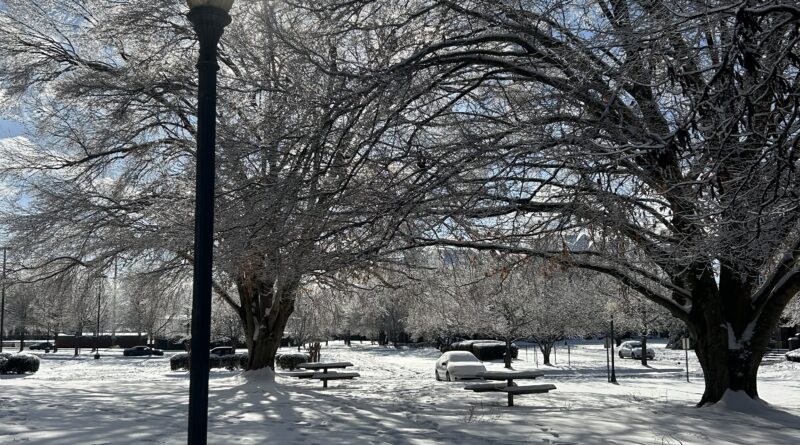Maryville College facilities respond to historic snowfall
Severe winter weather, including a rare accumulation of 8.5 inches of snow within five days, brought unprecedented challenges to Maryville College.
The inclement weather began on Sunday, Jan. 14, with a trace of snowfall in the Maryville/Knoxville area, persisting into the following day. On Jan. 15, in observance of Martin Luther King Jr. Day, Maryville College was closed. During the holiday, the National Weather Service (NWS) reported 6.3 inches of snowfall, leading to class cancellations the next day. An additional 1.9 inches of snow fell, prompting virtual classes for the rest of the week, with the college and select services remaining closed. A two-hour delay was implemented on Monday, Jan. 22, with the NWS still reporting 3 inches of snow on the ground.
In total, Maryville College saw 8.5 inches of snowfall within five days, marking the longest recorded period with at least 4 inches of snow on the ground for this area.
According to Amy Lundell (’06), an alumna and current Maryville College archivist, such significant snowfall hasn’t occurred since 1996 when classes were canceled for three days.
“I know we never got out of school for more than a day when I was a student, and usually it was just a two-hour delay instead. As MC has traditionally been a primarily residential campus, getting a day off has been pretty rare,” Lundell said.
Bo Long, manager of Mechanical Trades for Facilities Operations at the college, acknowledged the challenges but emphasized the successful adaptation of facilities to the situation.
“A lot of times these situations are dependent, not just on what we have on campus but the support that we get outside of campus,” Long said. “If the local municipalities can’t, for example, make it to where we can get [to campus] there’s not much we can do.”
According to Long, the city of Maryville and Blount County ran out of salt two days after the snow started.
Maryville College Facilities Operations had a pre-existing arrangement with an outside vendor for snow removal, according to Long, specifically clearing campus roads and entrances for snowfalls of an inch or more. However, this arrangement proved ineffective due to the volume and compaction of the recent snowfall.
Long highlighted the priority of maintaining essential services during severe weather events, such as dining services and heat. He revealed challenges faced with external services, such as garbage pickup, pausing unexpectedly during bad weather.
“We had a situation where Waste Connections, who we use for garbage pickup, had quit working with no notice for 10 days.”
Long commended the dedication of Facilities Opeations crew despite the severe weather. While the facilities team ensured the maintenance of indoor heating, the grounds workers were actively braving the cold conditions. Long shared that five members of the grounds team manually shoveled the Clayton Center parking lot, steps and sidewalks, to ensure that scheduled shows for the week could proceed as planned.
“Those guys were heroes, really. But I’ve said that since the day I started working here. Those are the hardest-working people on campus by far.”
Despite the devoted efforts of grounds employees, some students reported difficulties with walkability on sidewalks and parking lots, recounting incidents of slipping and falling on ice around campus.
First-year student Lillian Peterson was home for the long weekend and got snowed in off-campus. When she returned on Sunday evening of the following week, Peterson’s car got stuck in a sheet of ice on campus roads.
“I called security, and an officer showed up within 10 minutes,” Peterson said. “She was unable to help me, and a bystander ended up using their truck to pull me out of the ice. It took over 40 minutes for me to get from the front of campus to Pearsons [Hall], the building I live in.”
Maryville College Security declined to comment on this particular incident, but offered information about their general services and the way these services were affected by the weather.
Dennis Pumphrey, director of Safety and Security, said, “We did a lot of things successfully with the weather. One of the things we were certainly trying to do was get into the buildings often to make sure that we didn’t have any water leaks, and I know that Facilities was just as dedicated to that as we were, if not more so.”
Additionally, he added, security continued to patrol campus both by vehicle and on foot to ensure the safety of students. Pumphrey also pointed out that the college was understanding of those who were not able to make it back to campus due to road conditions.
“Students shouldn’t feel obligated to take a chance when they shouldn’t have to take a chance,” he said.
Looking ahead, the facilities team is exploring the acquisition of additional vehicles with plows and salt spreaders to enhance the efficiency of snow removal on campus. However, they acknowledge the potential excess of heavy-duty equipment for snow removal, considering the infrequency of such extreme weather conditions at the school over the past 30 years.

